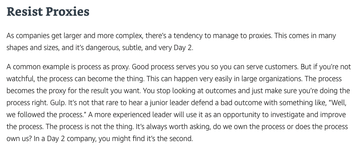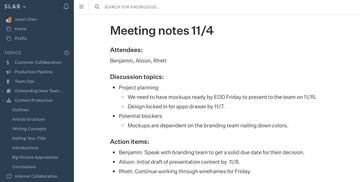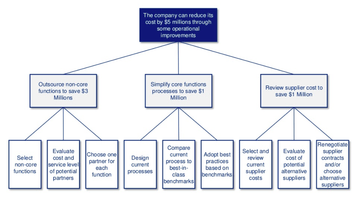How to 10x Your Own Productivity as a Manager through Writing
Managing a team is all about communication.
Contrary to popular belief, that doesn’t just mean holding meetings or updating Kanban boards. It means mobilizing others, transferring important concepts, and inspiring your team to do great things using the tools you have.
The problem of communication is also a “one-degree” problem. Get it off by just a little bit, and your team can end up in the completely wrong destination.
Communicating as a manager, in other words, is like walking on a razor’s edge. With not enough communication, you end up letting your team flounder. With lossy communication, you send people in the wrong direction.
That’s why the simplest way to make yourself dramatically more productive as a manager is to improve your writing. Writing is the medium with the highest signal-to-noise ratio.
When you work on your writing, you make your company mission more memorable, keep your team (and yourself) accountable, and level up everyone’s analytical-thinking abilities.
Writing makes the mission memorable
One of the earmarks of a good leader is their ability to communicate complex and disparate ideas effectively. When you codify information into something that is memorable and straightforward, it helps you get the point across faster and requires less back and forth with the team. This alleviates confusion and gives you more time to spend guiding vision instead of explaining circumstances.
Amazon founder Jeff Bezos understood that when you find the right words to package your value and mission statements, it forces the rest of the team to recalibrate their thinking.
“What Jeff understood was the power of rhetoric. Time spent coming up with the right words to package a key concept in a memorable way was time well spent. People fret about what others say about them when they’re not in the room, but Jeff was solving the issue of getting people to say what he’d say when he wasn’t in the room.” Eugene Wei, Compress to impress via Remains of the day
Shifting organizational focus at this scale is hard. As a manager, you need to formulate each set of ideals into something that sticks in your team’s collective consciousness. Instead of *Make every customer interaction extraordinary *use *Deliver WOW through service. *That’s how Zappos anchored their #1 core value in the minds of their team.
A powerful mission statement helps ensure that even with the day-to-day distractions your team experiences, it’s always easy to tie their actions back to the company mission.
Take these statements from Bezos’ 2016 letter to shareholders:

At Amazon, they think about their company from a single perspective—it is always Day 1. Bezos is able to distill an entire philosophy down to two words.
Short, declarative statements help decrease the cognitive overhead needed to understand each concept.
From there he goes on to talk about different strategies that help make sure that it never becomes Day 2 at Amazon.

Each strategy is broken down in a few paragraphs and codified through section headers—each header not only providing a logical structure for the reader to follow but compressing each idea into an easy-to-remember, two-to-four word phrase.
Structured rhetoric like this is a very powerful tool—it creates ideas that are made to stick.
It will take time and practice to get to the point where you’re thinking deeply about your company mission and how to articulate it to the team, but putting in the time upfront will save you countless hours down the line. You’ll cut back on 1:1 meetings spent talking about values and how to incorporate them into everyday tasks and spend that time focusing on leveling up your team instead.
Writing makes it easy to hold people accountable
As a manager, you need to be on top of your own work as well as the output of your team. Any time spent rehashing a previous conversation or resetting expectations for a project will have a negative impact on everyone’s productivity. When you are obsessive about documenting as much information as possible, it cuts down on the time it takes to move projects forward and opens up more opportunities to focus on larger goals.
Relying on verbal communication alone causes unnecessary knowledge gaps for the whole team. Without written documentation, the conversations you have are inherently lossy—no one can remember everything that was said over the course of a 30-minute 1:1 or hour-long training.
To be productive, you need a comprehensive recounting of what happened as well as a comprehensive recounting of what needs to be done in the future.
Which is why you need to write down the important conversations. That makes it easy to:
- Set expectations: It’s easy to come away from a verbal conversation with differing ideas of what needs to be done. You need to determine the specific outcomes of every meeting and ensure that everyone understands what they need to do as a result.
- Solidify action items: Meetings exist to share information and make sure everyone knows how to move forward in the same direction. If you don’t write down next steps, it can lead to confusion—make a solid plan that outlines specific next steps for everyone.
- Define responsibilities: To move forward as a cohesive team, everyone needs to understand what they are responsible for as well as how their work affects others. Document what every member of the team is responsible for and how it fits into the bigger picture.
Consider the last 1:1 conversation you had—did you write down the expectations, actions items, and responsibilities? If not, you will likely need to follow up with everyone involved and spend more time formulating a concrete plan.
That’s why meeting recaps are so important—they keep your team accountable for their actions and memorialize the conversation for future reference.

Without a comprehensive overview of what was discussed as well as what each member of the team is responsible for moving forward, it’s impossible to keep everyone on track.
This example shows who was involved in the meeting, recaps what they talked about, and sets action items for work moving forward. Each member of the team can reference this document at any time without having to reach out to their manager for clarification.
The five minutes it took to write up this recap is more efficient than the potential five-minute conversations with every member of the team. As a manager, you’ll be able to hold all three team members accountable for their work and solidify a clear path to move the project forward. Written documentation like this also gives you a way to track the progression of a project over time—each recap stands as evidence of a step forward.
Writing forces higher-level thinking
Being able to effectively communicate vision and mission to your team requires an exhaustive understanding of their impact on the company as a whole. The simple act of writing these ideas down will help you reach this high level of understanding faster and make it easier to present them to the team. If your arguments aren’t laid out in a way that makes it easy for the team to digest and execute on, you’ll be forced to spend more time following up individually in the future.
That’s why it’s important to create a structured narrative around your written communication. Take this quote about how Jeff Bezos communicated with his team in the early days of Amazon.
“As a hyper intelligent person, Jeff didn’t want lossy compression or lazy thinking, he wanted the raw feed in a structured form, and so we all shifted to writing our arguments out as essays that he’d read silently in meetings. Written language is a lossy format, too, but it has the advantage of being less forgiving of broken logic flows than slide decks.” Eugene Wei, Compress to impress via Remains of the day
Bezos and his team understood that when you have to build your ideas into a narrative essay, it forces the writer to think more upfront.
Consider how slideshows function—presentations are fragmented into distinct snippets of information that are digested piecemeal by the team. It’s easy to forget what was said on slide five by the time you reach slide seven. The long-form essay bypasses this issue entirely—each piece of information is connected to the next through a narrative that builds a structured argument.
The implications of unclear expectations or misunderstood directives will have a lasting negative impact on the company over time. When you write down your thoughts, it gives you a way to fix any plot holes and logical gaps in advance of talking to the team.
It can be helpful to employ the Pyramid Principle to help structure these arguments effectively.

Pyramid Principle example via Slideshare.
Employing this kind of structure gives you a framework for organizing your arguments.
When you’re able to logically present any idea to the team, it gives them the context they need to move forward effectively. It will require more input at the beginning of the process, but the clear structure will be easier for your team to understand and reference in the long run.
Let writing boost your productivity
Good managers write stuff down to create valuable context for their team.
When you write down your ideas, they’re easier to communicate— you’ll have no problem building a narrative that tells a real story for every member of the team. This makes the company values and mission clear and helps keep every member of the team headed in the same direction.
If everyone on your team is fully accountable for their own work, understands how it fits into the bigger picture, and can execute autonomously, it will increase overall productivity and free up your time to focus on higher-level initiatives. Your written communication is the key to more efficient and more effective leadership.
